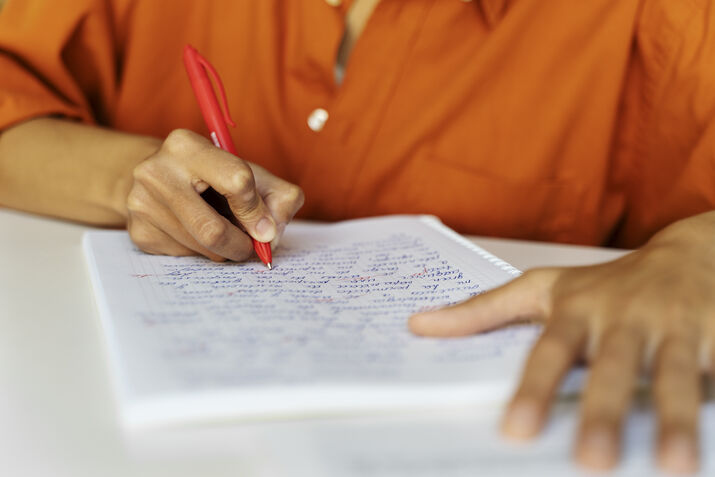How to Write a Thesis & Dissertation Acknowledgements: Tips & Examples
Writing acknowledgments for a thesis or dissertation is a way of expressing gratitude to the people who have provided significant support throughout the long academic journey. What they contributed may have been in terms of research, moral support, or even financial, among other ways. Hence the need to acknowledge them. This paper demonstrates how to structure your acknowledgment and provides examples to inspire you to write your own.
Who to Thank in Your Acknowledgements
In determining who should be appreciated, individuals with the most significant impact on scholastic development should be given first consideration. Here is a catalog of those people to be thanked in the acknowledgment of the thesis:
- Educational Advisors and supervisors –played a crucial part in guiding the study and providing valuable feedback.
- Board Members –They reviewed your work, provided feedback, and ensured the academic standard of the dissertation.
- Individuals and Associates – Peers or coworkers and any individuals who worked collaboratively, shared resources or provided moral support.
- Relatives and Companions – Emotional and sometimes even financial support is commonly received from family and friends during your academic pursuit.
- Sponsors or Foundations – Acknowledge the establishments that supported you, where there is a provision of financial aid, grants, or other forms of support.
How to Write Acknowledgements

The acknowledgments should not only be well-written but also easy to read. Take the following key steps when writing your acknowledgments; here is a structured format to guide you.
- Begin with formal acknowledgments: Start by expressing your appreciation to your supervisor and committee members for their expertise and support.
- Acknowledge colleagues and collaborators: Any person involved in the work must be acknowledged.
- Family and friends come in the end: They are essential but typically appear in the final part of the section.
- Conciseness and Politeness: Your acknowledgments should not be very long. Try to write a paragraph or two for each main person.
Acknowledgements Section Example
This is how a good dissertation acknowledgment should be phrased:
“First and foremost, I am highly grateful to Dr. John Smith, my supervisor, without whose guidance, feedback, and patience it would not have been possible for me to complete the research to such an extent that the quality of the dissertation reflects his expertise.
Thanks, are also due to my committee members, Dr. Emily White and Dr. Robert Brown, for their suggestions and for having confidence in me. This has enhanced the quality of my work.
I would like to extend my appreciation to the staff at the Research Institute for their cooperation and support, especially Jane and Mark, who worked with me on the analysis.
And my most excellent thanks go to my family for their love. Belief in me that sustained.”
Acknowledgements Dos and Don’ts
When writing your dissertation acknowledgments, it’s essential to keep the following dos and don’ts in mind:
Do:
- Express true thanks: Show genuine appreciation for every individual or group.
- Use formal wording: and maintain a respectful tone, even when expressing gratitude for personal ties.
- Clearly state: Explain well the contribution of every person or group to your research.

Don’t:
- Make it too long: Keep the acknowledgments to the point—don’t add irrelevant details.
- Personal grievances: This section is not for venting personal grievances. It is about focusing on the positive contributions that can be made.
- Casual language should be avoided, as the tone should be kept professional, especially when communicating with academic colleagues.
What Are Dissertation Acknowledgements?
Acknowledgment in a dissertation is a formal appreciation extended to persons who offered any type of support throughout the dissertation process. This may involve mentors, family, friends, coworkers, or employees of a company or organization. The section does not, in any way, relate to lauding the work but rather to the people who helped in its completion.
What to Consider When Writing Your Dissertation Acknowledgments
- Tone: It should be respectful and professional, but it’s fine to show real feelings when thanking family and friends.
- Clarity: Be clear and short in saying what each person did.
- Balance: Do not focus too much on any one person unless what they did was really great.
Who to Thank in Your Dissertation Acknowledgments
Dissertation acknowledgments typically focus on individuals or organizations that had a direct impact on your research process. Here’s a reminder of who to thank:
- Supervisor and committee members for their academic guidance.
- Colleagues or research partners for assisting in the research.
- Loved ones and friends for their support.
- Any agencies that provided funds for your dissertation work.
What (and What Not) to Write in Your Dissertation Acknowledgments
What to Include:
- A word of thanks to my supervisor, committee members, and all who were directly involved in my research work.
- Specific details of how each person or group helped me.
What to Avoid:
- Almost anything that is not directly relevant to my academic work.
- No irrelevant details or information not on the topic at all.
- It is not the place to air any grievances or express negative comments about my experience.
What (and What Not) to Write in Your Dissertation Acknowledgments
Here is another example of an excellent dissertation acknowledgments section:
“I am writing to express my gratitude to Dr. James Harris, my advisor, for his unwavering support and the incredibly insightful advice he has provided me throughout the development of my research for the dissertation.
I am also grateful to my second and third readers, Dr. Olivia Green and Dr. Michael Black, for their constructive feedback and thoughtful suggestions, which substantially improved this dissertation.
I would like to extend my appreciation to my associate Susan for the assistance in data collection and its analysis and to my friends for the moral support throughout.
In the last instance, I wish to put on record my heartfelt thanks to my family, especially my parents, for their love and unwavering encouragement throughout this time.”
A Final Word on Writing Dissertation Acknowledgments: Have Fun!
Writing the acknowledgments for your dissertation should be an enjoyable and reflective process. It’s a moment at which you will put out the expression of appreciation to the people who have been of help. Therefore, take a moment to write a thoughtful and honest message for those who were behind you.
Where Do Acknowledgements Go in a Dissertation?
More commonly, the section of acknowledgments is placed after the contents and before the introduction of your dissertation so that this will be one of the very first things that your readers would come through, and you can thank those people who supported you at the very initial stage.
Tips on How to Write Dissertation Acknowledgements

Here are some valuable tips that will help you write effective dissertation acknowledgments:
- Formal yet heartfelt: The form should maintain a professional tone while the content conveys sincere gratitude.
- Short and Sweet: The section’s length should not be elongated, yet it should carry substance; ideally, a maximum of two pages.
- Systematic: Each set of persons (supervisors first, then colleagues, and finally, family) must be thanked separately, ensuring the identity of each group is maintained.
Dissertation Acknowledgements Examples
If you need inspiration, you will look through the examples of dissertation acknowledgments from other researchers in your area of interest. You can find samples in university libraries or through academic databases. However, be sure that they accurately reflect your personal experience.
Acknowledgements Best Practices
- Detail: Show clearly how individual or corporate bodies played a part in your work.
- Stay Formal: Avoid using overly informal language, even when thanking family and friends.
- Be Brief: Although you may feel a great deal of gratitude, do not overdo it.
Unveil Your Gratitude with Your Dissertation Acknowledgements
The acknowledgments section is your opportunity to express gratitude to those who contributed to making your study possible. Use this part to thank your academic teachers, friends, funding groups, and your family. With the right tone and structure, you’ll create a dissertation acknowledgments section that effectively conveys your gratitude and demonstrates your skills.
Common FAQs About Acknowledgements Dissertation or Thesis

Can I thank God in my acknowledgments?
Yes, you can acknowledge a higher power if your faith has been a significant factor in your success. The expression of thanks should be respectful and within the norms of the scholarly document.
Do I have to thank my supervisor?
Yes, you can thank your supervisor for acknowledging your dissertation, as they have guided and supervised you throughout this research.
Whom should I thank in the acknowledgments?
Acknowledge your supervisor, committee members, research collaborators, family, and anyone else who gave you direct support throughout the process of conducting your research.
Where do the acknowledgments go in a thesis or dissertation?
Usually, they are placed in the text of your thesis or dissertation after the table of contents and before the introduction or abstract.
How long should the acknowledgments be?
The acknowledgments should range from one to two pages in length. Try to make it short and sweet.
What do you write in dissertation acknowledgments?
You thank those who have supported you through the highs and lows of your research journey, whether academically, emotionally, or financially.
How do you write an acknowledgment for a PhD thesis?
You mention your supervisor, committee members, and family, as well as any other collaborators in your research. You must explain how they helped you.
Who do you acknowledge in a dissertation?
Acknowledge your supervisor, committee members, peers, funding organizations, and family members who supported you through the process.
How do you acknowledge a dissertation supervisor?
Thank your dissertation supervisor for their guidance, feedback, and mentorship. Be specific about how their input helped shape your research.
Where do you put acknowledgments in a research paper?
In research papers, acknowledgments typically follow the abstract or appear at the end of the introduction, depending on the style guide or publisher’s requirements.
EXCELLENTTrustindex verifies that the original source of the review is Google. 5 stars for Online Dissertation Help I was very anxious because of my short deadline, but I received a well-structured dissertation on time. Whatever they promise, they deliver exactly the same work. I am really thankful to their team.Posted onTrustindex verifies that the original source of the review is Google. Quick and very helpful ! Highly recommendedPosted onTrustindex verifies that the original source of the review is Google. Writing dissertation was so stressful for me but with online dissertation help it become easy. They did everything perfect, well researched and on time. Because of them I got higher marks. I really appreciate their support.Posted onTrustindex verifies that the original source of the review is Google. Very good approach. You managed to understand and explain difficult topics in simple way. You are highly recommended.Posted onTrustindex verifies that the original source of the review is Google. With full of confidence i can say this she made my assignments and thesis work and gave me merit. Highly recommended.Posted onTrustindex verifies that the original source of the review is Google. Nice platform, great service. Recommendable and commendable…Posted onTrustindex verifies that the original source of the review is Google. Thanks to online dissertation help for providing top-notch dissertation assistance. I highly recommend them if you need help with your dissertation.Posted onTrustindex verifies that the original source of the review is Google. I recently used the services of 'Online Dissertation Help' ( Leeds) and was thoroughly impressed by the professionalism and expertise of their staff. From the moment I reached out, the team was incredibly supportive and responsive. They provided valuable insights and guidance that significantly improved the quality of my dissertation. The writers are clearly experts in their fields, and their attention to detail is unmatched. I highly recommend 'Online Dissertation Help' to anyone in need of top-notch dissertation assistance. Their services are truly exceptional and worth every penny!Posted onTrustindex verifies that the original source of the review is Google. A remarkable experience for me they where very helpful saved me time, effort and stress free as I have a very busy life with children and work they keep you updated with everything and make sure you are happy with it all - AI detected to. Great people to do for any assignments as I have had few now had high expectations marks and very affordable prices.Verified by TrustindexTrustindex verified badge is the Universal Symbol of Trust. Only the greatest companies can get the verified badge who has a review score above 4.5, based on customer reviews over the past 12 months. Read more
Our process starts when you place the order on our website after chatting with our agent.
Once the order is placed, it is ensured that it comes in our expertise before its acceptance.
A writer is assigned based on the degree requirement.
3 topics are shared for approval. The outline comprises of Research Gap, Research Questions & Objectives, and Conceptual Framework.
After outline approval, the proposal is drafted and submitted for approval.
The dissertation writing process begins based on approved guidelines.
Our Quality Assurance team ensures that the work is original and error-free.
The final dissertation is submitted after passing through all quality checks.




